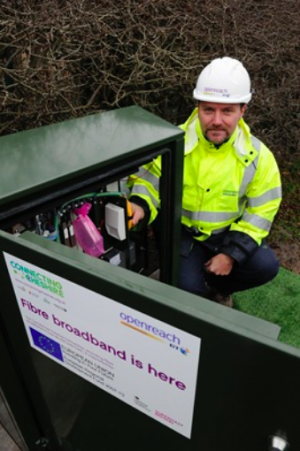
As reported last month, Alderley Edge will be one the first communities to benefit from the first phase of investment in new fibre broadband networks.
The £28.5m Connecting Cheshire broadband programme will be delivered by Openreach, BT's local network business, over the next 18 months.
To help explain how the roll-out will be delivered and the benefits of switching to high-speed fibre broadband, for home or business use, a drop-in briefing event will be held on 22nd January at Alderley Edge Festival Hall between 4pm and 8pm.
Experts from BT Openreach will be on hand to explain the technical and logistical challenges, plus there will be information and maps showing where and when the new services will be arriving. Information on the free superfast business support programme will also be available.
Councillor David Brown, Deputy Leader of Cheshire East Council, on behalf of the Connecting Cheshire Partnership said: "I urge everyone to attend this event to learn more about the benefits of faster broadband, which will transform how we work, how we learn, how we communicate with friends or family and how we entertain ourselves.
"The digital age is with us – so let's exploit it."
The telephone exchanges covering Alderley Edge and Lower Peover will be among the first to benefit from upgrades to fibre from the end of March onwards. This will be followed by exchanges in Mobberley, Chelford, Prestbury, Poynton, Disley and Sutton later in the year.
For more information on Connecting Cheshire and proposed fibre coverage visit www.connectingcheshire.org.uk
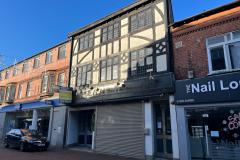

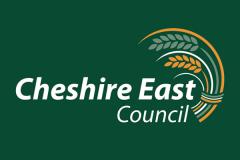




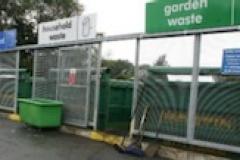
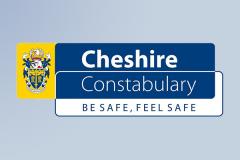
Comments
Here's what readers have had to say so far. Why not add your thoughts below.
All he could tell me was less than I already knew about fibre-to-the-cabinet (FTTC), using such language as "it's great! Your broadband will get a great big welly up in speed".
"But only as far as the cabinet, 1/2 a mile away down the road. After that it's back to the old copper pair", I retorted.
"Ah but the big welly up in speed pushes it faster down the last bit!" he enthused. He couldn't tell me how this would happen. Or why I might need to change my router, since as far as I could see I'd still be getting broadband over copper, so surely the fibre bit exchange-to-cabinet would be 'invisible' to me at home. He couldn't enlighten me at all and simply seemed to be programmed to enthuse an un-focussed message about 'high speed broadband' and how great it was going to be, without being able to explain how it would be implemented and exactly how it would (or would not) affect me as a user.
I left the hall disappointed. Then I espied a BT van in the car park with some demo equipment in it (a fibre cabinet linked to the old copper one). And best of all, a guy there who actually knew what he was talking about. I spent about half an hour with him, and he was very informative.
After speaking to him I understood that the fibre-to-the-cabinet (FTTC) would be installed in parallel with, not replacing, the existing copper cable exchange-to-cabinet network, and that I could carry on using my broadband exactly as I do today, with copper all the way from home to the exchange. When the fibre is commissioned I would have an option - carry on as now, or change to FTTC via my ISP. Changing would mean I'd need a new router as the copper line from the cabinet to the house would have to change from ADSL to VDSL (a higher speed technology for broadband over copper lines). Voice telephone communications between house and exchange would continue to use the all-copper link to the exchange for reliability reasons, even for customers who take up the FTTC option.
"So you are going to support 2 networks, a copper one and a fibre one, to the cabinet. Why not ditch the old copper one and run voice traffic over VOIP (voice over IP) on the fibre as far as the cabinet?"
"Because we have a duty to provide a simple reliable voice connection principally for emergency calls, and the old copper network isn't dependent on mains power and processors in the cabinets as is the fibre one. So it's more reliable."
I came away with a thorough understanding of what the FTTC offering was all about, and what all the options were, and how the technology would fit into the existing infrastructure, and why my home router would need to be changed if I were to take advantage of FTTC. None of this could be explained by the 'non technical' chap I spoke to in the Festival Hall. He knew less about FTTC that I did!
Thank heavens that ex-engineer technical guy was there in the van to explain all this. If I'd relied on the main presentation in the Festival Hall I'd have had a wasted journey!
BT - if you do this sort of thing in future, might I suggest you ditch most of the non technical sales staff and have more people there like the knowledgeable, enthusiastic, communicative, and technically competent guy I met in the van outside! People who take the trouble to come to a presentation generally want to know more than can be gleaned from your sales brochures. There's a good message to put across about BT Infinity, but the staff in the Festival Hall couldn't do that.